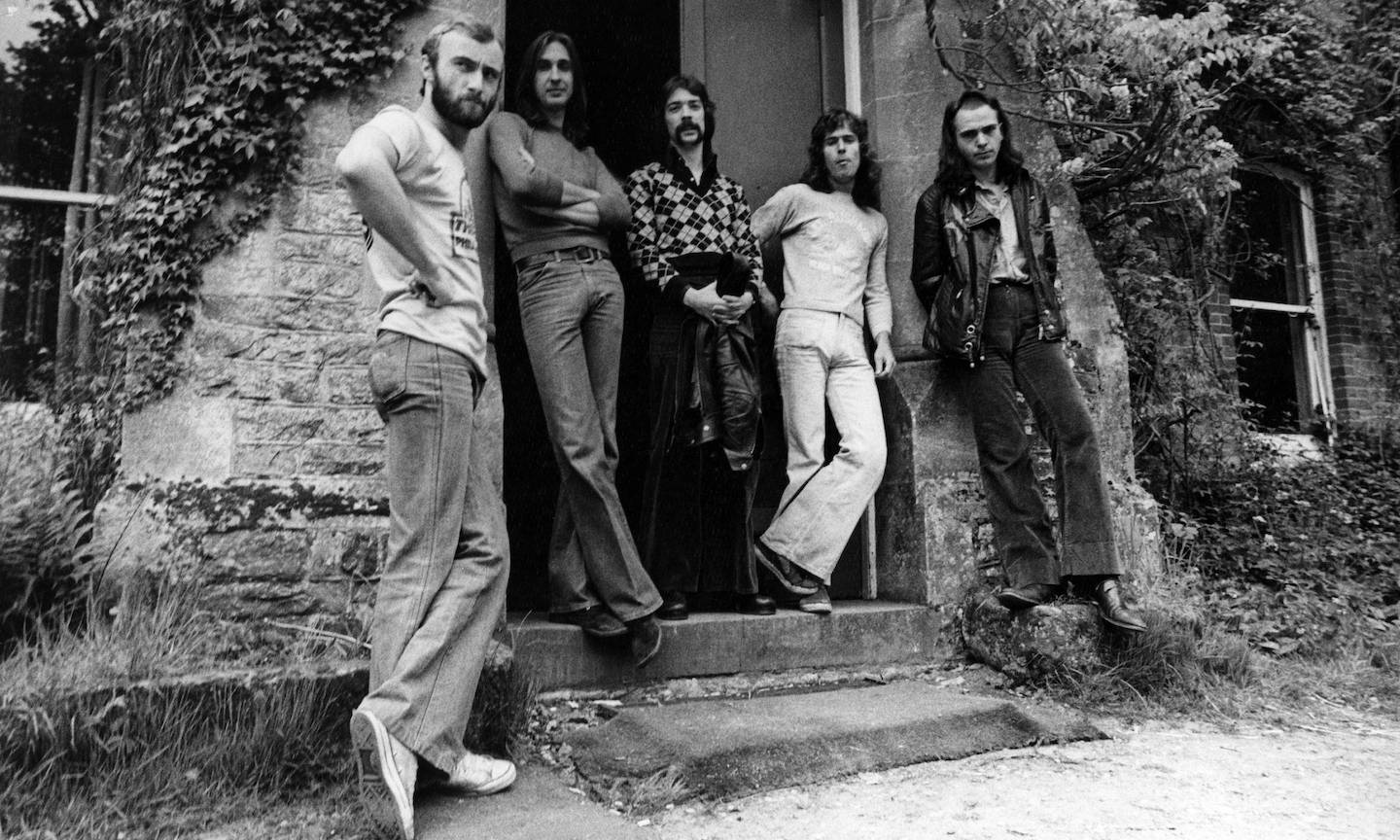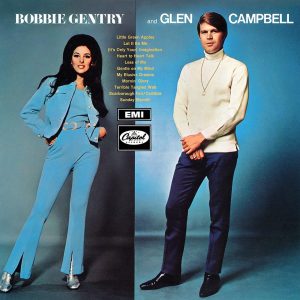The Genesis catalog is full of gems, singles, and deep cuts alike. In a recording career that lasted more than two decades, they covered the bases from tailor-made singles to nearly side-long tracks, from resonant love songs to elaborate flights of fantasy. This should also revive the eternal question of where to file your Genesis albums: Under prog-rock, mainstream pop, or somewhere in the middle?
It’s certainly true that they created many of prog rock’s cornerstone pieces during the early days, when Peter Gabriel was upfront and the live shows verged on musical theater. And it’s also true that they went on to unprecedented success after Phil Collins took over as lead singer – starting in 1976, but reaching a commercial peak with the Invisible Touch album 10 years later. Coupled with Collins’ solo mega-success and Gabriel’s at the same time, Genesis was dominating the charts, something that seemed unthinkable in the Nursery Cryme days.
Yet things were never that simple. Even at their loftiest, Genesis never aimed to be an esoteric prog band: Starting back in their teenaged days at the Charterhouse School, the members of Genesis always wanted to write hits. Their proggiest albums still had singles on them, some of which (including “I Know What I Like,” from Selling England by the Pound) charted in the UK. And by the same token, they never abandoned prog: The two biggest albums, Invisible Touch and We Can’t Dance, both included tracks that were far too epic for airplay. And some of their best-loved tracks over the years have been the ones that don’t fall squarely into either the pop or prog category.
Keeping that in mind, we’ve gone through the Genesis catalog and pulled out some of the brightest gems in all three groups: The prog, the pop, and the unclassifiable. As you’ll see, there’s plenty of both Peter and Phil in each category.
Order the greatest hits collection, The Last Domino, and scroll down for our Top 20 Genesis songs.
The Prog Genesis
The Musical Box, Supper’s Ready, Dancing With The Moonlit Knit, …In That Quiet Earth, Afterglow, Fading Lights
Without a doubt, some of the best Genesis songs are prog touchstones, especially during the Peter Gabriel era. To this day, “The Musical Box” may have the most outlandish plot of any prog epic: A Victorian girl decapitates her brother playing croquet and his ghost appears when she fires up his beloved music box, and….things don’t go well. The instrumental sections follow the emotional flow of the encounter, and Gabriel’s vocal builds to a dramatic climax.
It’s tough to think of “Supper’s Ready” as a single song, since the 23-minute piece is comprised of separate parts that can stand on their own, but the songs are doubly powerful within the whole suite, which begins with a haunted moment between two lovers, takes a surreal detour through Willow Farm, and ends with the Apocalypse.
Genesis would wind up doing its more progressive work within the 8-10 minute range. Prime example: The next album’s leadoff track, “Dancing With the Moonlit Knight” – a mini-epic that begins with Gabriel a cappella, builds to dazzling grandeur, then leaves you with two minutes of lovely atmospherics. Putting fantasy aside, the lyrics explore the discrepancy of England’s mythic past and its consumerist present. US ears missed some of the references (for instance, “knights of the Green Shield” refers to supermarket trading stamps) but that made Anglophiles love it all the more.
Purely instrumental tracks never played a huge part in the Genesis canon, but “…In That Quiet Earth” was one that didn’t need lyrics. Effectively Steve Hackett’s farewell to the band, it’s a grand, cinematic escapade that harks forward to his solo career. It segues on Wind & Wuthering into “Afterglow” – not the first or last Genesis love song, but the most intense of them all.
Even during their chart-topping days, Genesis never abandoned prog. Thus the singles-heavy We Can’t Dance ends with “Fading Lights,” a 10-minute piece that begins on a somber and reflective note, before Tony Banks’ keyboards take control and carry it into the stratosphere. As the last song by Genesis’ most successful lineup, it makes a suitably bittersweet signoff.
The Pop Genesis
Silent Sun, Many Too Many, Turn It On Again, Land of Confusion
While some Genesis fans assumed the band turned pop due to Phil Collins’ new inclinations, their earlier songs would suggest otherwise. Just listen to their very first (pre-Collins) single, “Silent Sun.” It’s so much a pop love song that it even has the word “baby” in the chorus. Genesis tend to dismiss their earliest work as young and naive – which “Silent Sun” certainly is, but it’s also lovely, and can stand with early Bee Gees or Moody Blues.
But Genesis didn’t really get back to shorter songs until the post-Steve Hackett album …And Then There Were Three…, with an unheard-of 11 tracks. The catchy “Follow You Follow Me” was the commercial breakthrough, but the buried treasure was the UK follow-up single, “Many Too Many.” Its haunting tune and emotive Collins vocal put across the romantic angst that some group members were experiencing at the time. Also, note how the lost love is addressed as “mama,” an idea which they’d really run with a few albums later.
Not all of Genesis’ poppier tunes were sad or romantic. Originally the centerpiece of the scrapped Duke Suite, “Turn It On Again” was an exhilarating piece of jittery New Wave that gave the Cars and The Police a run for their money. The band sounded spare and tight and even the lyrics, about a man’s attachment to his TV, were sleek and modern. Genesis became a hit-singles machine on the Invisible Touch album, but its fourth hit, “Land of Confusion” always stood out – both as a rare topical number (with an eye-grabbing video to match) and as one of their few, guitar riff-driven rockers. Rutherford provided the memorable riff along with its lyrics, which avoid easy answers and call for awareness.
The Outliers
Back in NYC, Carpet Crawlers, Abacab, Mama, The Diving Line
The real beauty of the best Genesis songs is that they don’t fall squarely into the prog or pop boundaries. The double-LP epic The Lamb Lies Down on Broadway inhabits a universe of its own. Tied to a Gabriel narrative that manages to be mind-bogglingly surreal and emotionally resonant at once, The Lamb found the band branching out as never before. Because the hero Rael is a New York graffiti artist, it wouldn’t work to make the music too twee or English-sounding. So you get an out-of-nowhere triumph like “Back in NYC,” where the riff really pounds and the sound is something close to glam-punk.
Another Lamb highlight, “Carpet Crawlers,” might be called a surrealist painting set to music, with a world of visual details in every lyric line. It’s one of Genesis’ most hypnotic tunes and the chorus makes the most of the Gabriel/Collins harmonies, by now the band’s secret weapon.
Abacab may not be the most beloved Genesis album, but there’s a real thrill of discovery here as the band shook off its prog origins and tried new possibilities. The title track “Abacab” was one of the liveliest rockers they’d ever produced, with its abstract lyrics and abundance of great hooks. After the moody solo debut Face Value, Phil Collins now sounds like he’s having the time of his life.
Now that Collins was a genuine pop star, some fans claimed that Genesis’ most adventurous days were over. So how do you explain them producing something as edgy as “Mama,” and releasing it as a single? It’s seven minutes of pure drama and darkness, with Collins voicing the tangled emotions of a young man visiting a sex worker. The band completely shook up its instrumental formula on this track, employing drum machines, atmospheric keys, and guitars, and no solos of any kind.
Calling All Stations will forever be the lost Genesis album because the new lineup with singer Ray Wilson didn’t wind up flying. But at least one track, “The Dividing Line,” proves they were on to something. The song puts rhythm upfront in a way Genesis seldom did before, with a strong Wilson vocal and the instrumental section gathers plenty of steam as Rutherford and Banks trade riffs atop an onslaught of percussion (Israeli drummer Nir Zidkyahu was a real find).
Solo standout moments
In The Cage, It’s Gonna Get Better, Watcher of the Skies, Los Endos, The Return of the Giant Hogweed
Some of the best Genesis songs are a showcase for the individual strengths of the five classic-era members. Peter Gabriel gave some unearthly performances during his term as frontman, but in terms of inhabiting characters, few moments could match “In the Cage.” In contrast, Phil Collins’ best vocal moments in Genesis are direct and emotional. His delivery powered a stack of hits, but one deeper track especially bears out his desire to be a genuine soul singer: “It’s Gonna Get Better,” from the self-titled ‘83 album. His vocals are pure and heartfelt, and he builds drama as the song goes on, peaking with the falsetto part in the bridge – not a register he often sang in – but he pulled it off beautifully here.
The more grand and majestic a Genesis song is, the more you usually hear of Tony Banks’ keyboards. Foxtrot may well be the only prog album open to open with two minutes of solid Mellotron, and Banks’ opening solo on “Watcher of the Skies” truly sounds like an ascent into the heavens.
Mike Rutherford made much of his impact as a songwriter and later as a guitarist, but let’s not forget that he was an absolute monster on bass guitar – especially just before he switched over. He’s the main reason why “Los Endos” is one of Genesis’ most exciting instrumental pieces, with a propulsive bassline that pushes the band into the untried territory of Latin music.
When Genesis brought Steve Hackett into the fold, they wanted a lead guitarist who’d play more aggressively than the pastorally-inclined Anthony Phillips. They got their money’s worth on “The Return of the Giant Hogweed” from Nursery Cryme, his first with the band. From the coiling opening riff to the fuzz-toned parts throughout, Hackett delivers. His solo here is often cited as the birth of tapping – entirely possible – and a killer solo in any case.
Listen to the best Genesis songs on Apple Music and Spotify.




